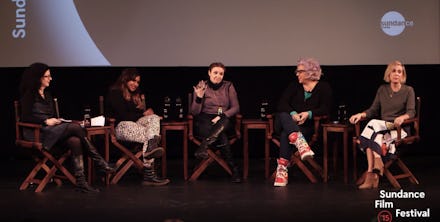Lena Dunham Just Exposed the Most Debilitating Sexist Double-Standard For Female Artists

Surprise: It's being a woman.
A quick glance at history makes this obvious: Women have long battled for their right to be artists. When they are, they are hidden, overlooked, dismissed or criticized into infamy.
This last point was discussed this Saturday by a panel of some of today's most creative women in film and television at the Sundance Film Festival. Moderated by the New Yorker's Emily Nussbaum, panelists Mindy Kaling, Lena Dunham, Jenji Kohan (creator of Orange Is the New Black) and Kristen Wiig broached the many double-standards facing them as female artists.
Kaling and Dunham in particular seemed to agree that one of the most limiting double standards is also the most fundamental — the fact that both critics and the public insist on reducing their work to personal anecdotes, consequently refusing to see these women as artists in their own right, but rather narcissistic autobiographers.
They should know. In both of their careers, Kaling and Dunham have observed culture's refusal to see them as separate entities from their characters. "More than any other male characters," Kaling explained, "people really do think that what my character is saying is what I believe."
Culture, however, doesn't seem to confuse the male artist with his art. This is why men are far more likely to be allowed to stand outside of their characters and their art without comment. We could call this sexist phenomenon the Woody Allen Paradox; or the fact that women aren't allowed to be introspective or to explore subjectivity in their art.
As Dunham so aptly put it, "Woody Allen is proof that people don't think that everything he says in his films is stuff that he does, because all he was doing was making out with 17-year-old girls for years and we didn't say a word about it. ... I don't think that, you know, Larry David or Woody Allen or anyone else playing some version of themselves are walking around with a million people who think they know and understand you on a deep and abiding level."
This double standard is a big problem. Female art negatively pigeonholed as autobiography hinders the advancement of women in the arts because it implies that women can't be creators — or that they can only be creators in one traditionally accepted way, as mothers to the human race.
This is particularly true of artists like Kaling and Dunham, who don't necessarily create their art as a type of catharsis, or healing, and certainly don't portray representations of ideal womanhood or female "role models," despite society's desire to see them as such. "Likeability isn't remotely important to me," Kaling notes. "Relatability is very important to me." There is no such thing as the perfect woman, and if she were she'd be an incredibly boring, one-dimensional Pollyanna on TV.
I don't think that, you know, Larry David or Woody Allen or anyone else playing some version of themselves are walking around with a million people who think they know and understand you on a deep and abiding level.
What happens when female artists like Kaling and Dunham do give us complex characters is that culture refuses to see their complexity, instead superimposing the creator over the character. Just look at the way Dunham was pilloried after her character Hannah's "voice of a generation" comment was attributed to her own beliefs. "It is a confusing thing when people equate the words that come out of your character's mouth with some real-world philosophy that you absolutely don't possess," Dunham explains.
The challenges women face in media are exponential, and they don't only exist in terms of representation behind and in front of the camera. The most harmful challenge lies at the basis of creating art in general, in terms of women being seen as artists. What Kaling and Dunham, along with Kohan and Wiig, attest to is the extent to which their work is undermined by critics who are unable to see beyond their womanhood, dismissing the necessity and importance of art that explores female subjectivity.